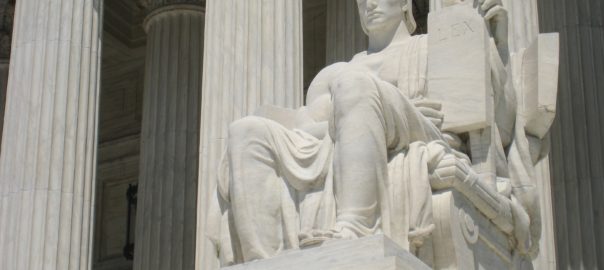US v Rought
No. 20-2667
Third Circuit Court of Appeals
Decided on August 24, 2021
You have the right to counsel: Contact an appeals attorney if you were denied your Miranda rights.
Issue:
Defendant Makes Incriminating Statements after Invoking Right to Counsel
Whether the District Court erred in denying defendant Rought’s motion to suppress evidence gathered after he invoked the right to counsel under the Fifth Amendment, but then continued discussion with the interrogator and made incriminating statements that resulted in his conviction and sentence of 360 months’ imprisonment.
Holding:
Miranda Rights Waived When Suspect Volunteers Information to Police
The Third Circuit held that the District Court did not err in denying the suppression motion as a defendant waives his post-invocation Miranda rights when he knowingly and voluntarily initiates an exchange with the police, or continues a discussion on a topic despite having requested counsel.
Federal Criminal Appeals Lawyer call 1-800-APPEALS (1-800-277-3257)
Facts:
Defendant James Rought was indicted for possession of fentanyl with intent to distribute resulting in death and serious bodily injury after allegedly selling a batch of fentanyl that caused two women to overdose. During an investigation by the FBI, defendant was advised of his Miranda rights verbally and in writing. The interrogator asked if he was willing to talk and Rought responded that he was, “to a point.” The interrogator emphasized he could stop at any time, then began to ask Rought about his drug use and his supplier, his criminal history, his relationship to the victims. When the interrogator asked about one of the victim’s death and “what happened there,” Rought responded that he didn’t “really want to talk about that aspect without my lawyer” and that “that’s a serious situation…they’re trying to roof me.” The interrogator then turned the conversation back to defendant’s drug supplier and discussed the rampant drug problem in the area. The defendant responded that drug dealers were “killing my friends just as much as, right now, you’re trying to say that I killed my friend.” The interrogator responded that he was not trying to say Rought killed the victim, but that he had a role in it, that he “must feel like shit,” to which Rought responded, “Absolutely.”
Rought moved to suppress his post-invocation statements on the ground that they were obtained in violation of Miranda v. Arizona, arguing that his invocation of the right to counsel was not limited to the circumstances of the victim’s death but was instead without limitation and that law enforcement was therefore required to cease interrogation entirely under Edwards v. Arizona, 451 U.S. 477 (1981). Rought also argued that after he invoked right to counsel, he did not initiate the post-invocation discussion about the victim, and that any post-invocation waiver of the right to counsel was not knowing and intelligent because he was not “fully aware” of the potential consequences. The District Court denied his motion and he was convicted by jury and sentenced to 360 months in prison.
Analysis:
Miranda Obligations
The Fifth Amendment provides that “No person…shall be compelled in any criminal case to be a witness against himself.” With Miranda, the Supreme Court “imposed certain obligations on police in custodial interrogations, in order to dissipate the ‘compelling pressures which work to undermine the individuals will to resist and to compel him to speak where he would not otherwise do so freely.’” (United States v. Velasquez, 885 F.2d 1076, 1084 (3d Cir. 1989) (quoting Miranda, 384 U.S. at 467). The Miranda warnings also dictate that police “must cease the interrogation if at any point the suspect indicates that he wishes to remain silent or that he wants an attorney.” (Id.) A waiver of Miranda rights must be voluntary, knowing and intelligent given the totality of the circumstances. A waiver is voluntary if “it was the product of a free and deliberate choice rather than intimidation, coercion, or deception.” (Colorado v. Spring, 479 U.S. 564, 573 (1987)). A waiver is knowing and intelligent if “made with a full awareness both of the nature of the right being abandoned and the consequences of the decision to abandon it.” (Id. at 573).
Post-Invocation Statements Admissible When Volunteered
With Edwards the Supreme Court established that “an accused person in custody who has invoked his desire not to speak until he has conferred with counsel ‘is not subject to further interrogation…until counsel has been made available to him, unless the accused himself initiates further communication, exchanges, or conversation with the police.’” (Edwards at 484-485). Post-invocation statements made during the exchange may then be admissible against him if the suspect knowingly and voluntarily waives his right to counsel and the right to remain silent.
With Connecticut v. Barrett, 479 U.S. 523 (1987), the Supreme Court held that not all invocations of the right to counsel are “effective for all purposes,” and that some can be “limited” in scope depending on the suspect’s desires. The defendant in Barrett refused to “put anything in writing until his attorney came,” but was willing to offer an oral confession despite knowing that police planned to record it. The Court held that Barrett’s statements were admissible, holding that nothing “requires authorities to ignore the tenor and sense of a defendant’s response to Miranda warnings.” (Id. at 528). The Court’s reasoning in Barrett is not limited to mode, and applies to invocations limited by topic or subject matter. The Third Circuit holds that after a limited invocation when the police have ceased interrogation about a covered topic, “an initiation occurs when a suspect initiations a [line of discussion that evinces] a willingness and desire for a generalized discussion about the [covered topic].” (Velasquez, 885 F.2d at 1085).
Defendant Offered “Limited” Invocation, Later Initiated the Topic of Interrogation
Defendant argued that his invocation of the right to counsel was not limited to the circumstances of the victim’s death, but was “for all purposes,” and that law enforcement was required to cease interrogation. The Third Circuit disagreed, holding that Rought proceeded to discuss a variety of topics including addiction, his fentanyl source, his criminal history, and only invoked the right to counsel on “that aspect” when the interrogator asked about the circumstances of the victim’s death. It is not plausible, the Court held, that by refusing to discuss “that aspect” of the case without a lawyer, Rought was actually expressing “his desire to deal with the police only through counsel.” (Edwards, 451 U.S. at 484).
Defendant also argued that he did not initiate the post-invocation discussion of the victim’s death. He asserted that there can not be a post-invocation initiation if the investigation never ceases, but the Third Circuit rejected this argument, explaining via Barrett that the interrogation need not cease following a limited invocation, but can continue to matters not covered by the invocation. Rought expressed his desire for counsel, the interrogator respected the right and refocused the interrogation on the defendant’s drug supplier. The Third Circuit held that defendant initiated the conversation about the victim when he stated that drug dealers were, “killing [his] friends just as right now…you’re trying to say that [he] killed” [the victim]. In offering this statement, he opened himself up to further investigation on the topic.
Defendant’s final argument that any post-invocation waiver was not effective because he was not “fully aware of the consequences” of waiving his right to counsel is meritless. The Third Circuit holds that a waiver is knowing and voluntary “if the defendant fully understands the nature of the right and how it would likely apply in general in the circumstances, even though the defendant may not know the specific detailed consequences of invoking it.” (United States v. Ruiz, 536 U.S. 622, 629 (2002)). The Third Circuit concluded that Rought’s waiver of his rights was voluntary, knowing and intelligent under the totality of the circumstances. He was read his Miranda rights, he signed a form acknowledging that he understood them, and consented to questioning. By choosing to speak in detail about the circumstances of the victim’s death, Rought waived his right to remain silent and his limited invocation of the right to counsel. The Third Circuit concluded, then, that defendant’s post-invocation statements were thus admissible against him at trial, and the District Court correctly denied his motion to suppress.
For Criminal Appeals In New York see www.appealslawfirm.com



